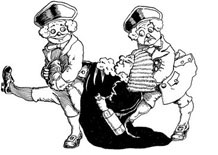
What Government Can Do for the Family: Just Leave It Alone!
THE SACRED FRONT DOOR
G. K. Chesterton described the home as the one anarchist institution. His choice of words was perhaps wayward. In most homes there is nothing anarchic; on the contrary, a good home exhibits a traditional structure of authority and division of labor based on sex, age, and relationship. Even the word “institution” is misleading, since it implies a beginning, some act of establishment. Let Marxists speak about the “institution” of the family, for they regard it as an artificial construction imposed by tyrannical men. Christians have a better language.
I am being deliberately unfair to Chesterton, who, as usual, by getting the details wrong has got the essentials right. He goes on to say that what he means by “anarchist institution” is that the home “is older than the law and stands outside the state.”
This is a very ancient way of viewing the home and the family that lives within it. It is the general Christian view, as well as the opinion of the wisest ancient pagans. In the 20th century this vision of the family as the precondition for human society has been labeled “agrarian” or “distributist,” but this view of the family is neither regional nor recent; it is, for the most part, the common sense of Christendom.
In recent American intellectual history, the term “agrarian” is usually applied to the group of writers whose essays appeared in I’ll Take My Stand (1930): John Crowe Ransom, Allen Tate, Donald Davidson, and Andrew Lytle; to their students such as Richard Weaver and Mel Bradford, and the novelist Madison Jones, and to their admirers, friends, and disciples. Prior to that, there was an American agrarian tradition represented by Thomas Jefferson, John Taylor of Carolina, and Edmund Ruffin — all of whom believed that the nation’s strength and integrity rested on the shoulders of independent-minded farmers.
You May Also Enjoy
"No man will be found in whose mind airy notions do not sometimes tyrannize and force him to hope or fear beyond the limits of sober probability."
God graciously gives some persecuted Christians opportunities to start again. He continues to work in the life of the D’Souza family via their many advocates.
As children we sang, “Sticks and stones may break my bones but names will never…

